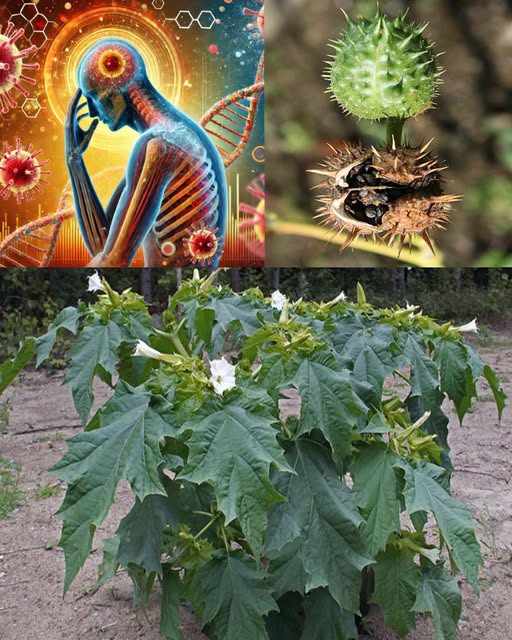Datura stramonium, also known as thorn apple, jimsonweed, devil’s trumpet, or simply datura, is a plant that has captivated and alarmed people for centuries. Its dramatic appearance and potent chemical properties make it a subject of interest in botany, traditional medicine, and folklore. However, its highly toxic nature demands caution and respect from anyone who encounters it.

Botanical Overview
Datura stramonium belongs to the nightshade family (Solanaceae), which also includes familiar plants such as tomatoes, potatoes, and deadly nightshade. Originally native to the Americas, this plant has spread worldwide, thriving in a variety of environments, particularly in disturbed soils like roadsides, pastures, and waste grounds.
Key Features:
- Height: Grows up to 1.5-2 meters tall.
- Leaves: Broad, dark green, with irregular lobes.
- Flowers: Large, trumpet-shaped blooms that are usually white or pale purple, emitting a heavy, sweet fragrance. These flowers open at night, adding to the plant’s mysterious allure.
- Seed Pods: Spiny, oval capsules that split open when mature to release numerous small, black seeds.
Chemical Composition and Effects
Datura stramonium contains a variety of powerful alkaloids, including:
- Atropine
- Scopolamine
- Hyoscyamine
These compounds act on the central and peripheral nervous systems, blocking the neurotransmitter acetylcholine. The effects range from mild sedation to intense hallucinations, delirium, and severe toxicity. Ingestion or exposure to any part of the plant can result in life-threatening symptoms, highlighting its potential danger.
Historical and Cultural Uses
Throughout history, datura has been used in various cultural contexts for its medicinal and psychoactive properties. Traditional healers have employed it for pain relief, muscle relaxation, and as an anesthetic. In some cultures, it has also been used in spiritual or shamanic rituals due to its hallucinogenic effects. However, these uses come with significant risks, as the line between a therapeutic and toxic dose is razor-thin.
Health Risks of Datura Stramonium
While its flowers may be visually appealing, Datura stramonium is one of the most toxic plants known to humans and animals. The alkaloids found in its leaves, flowers, seeds, and roots can cause severe poisoning, even in small amounts.
Symptoms of Poisoning Include:
-
- Hallucinations
- Delirium
- Rapid heartbeat
- Blurred vision
- Dry mouth
- Difficulty swallowing
- Severe cases may lead to coma or death.
Accidental Poisonings and Concerns
Despite its toxicity, Datura stramonium is sometimes grown for its ornamental value. Additionally, its seeds are occasionally used in traditional medicine or recreationally for their hallucinogenic properties, which increases the risk of accidental poisonings. This is especially concerning in households with children or pets who may unknowingly come into contact with the plant.
Prevention and Management
To prevent accidental exposure and poisoning, it is vital to take precautions when dealing with Datura stramonium.
Tips for Safety:
- Familiarize yourself with the plant’s appearance to identify and avoid it in your garden or local area.
- Wear gloves and protective clothing when handling or removing the plant to avoid skin contact.
- Dispose of the plant and its seeds safely, ensuring they are out of reach of children and animals.
- If ingestion or contact is suspected, seek immediate medical attention.
Prompt treatment is critical in cases of poisoning, as the alkaloids in datura can quickly cause severe symptoms. Time is of the essence in ensuring a positive outcome.
Datura Stramonium in the Garden
While its dramatic flowers and unique seed pods may add an exotic touch to your garden, the risks associated with Datura stramonium make it a poor choice for most landscapes, particularly in environments where children or pets are present. Opting for safer, non-toxic plants can help ensure the safety of your household and visitors.
If you suspect Datura stramonium is already growing in your garden, take immediate steps to remove it. Research the safest methods of disposal, and never burn or compost the plant, as its toxins can remain active.
A Plant of Contrasts
Datura stramonium is a plant of striking contrasts—beautiful yet dangerous, medicinal yet toxic. Its role in history, traditional medicine, and modern applications highlights its dual nature. While its unique features make it a subject of fascination, it also serves as a powerful reminder of nature’s potency.
Caution, respect, and awareness are essential when encountering this enigmatic plant. By understanding its risks and taking appropriate precautions, we can admire Datura stramonium’s beauty from a safe distance while protecting ourselves and those around us.





